- Home
- Matt Hilton
Dead Men's Dust Page 6
Dead Men's Dust Read online
Page 6
“Fatty, you just don’t realize it yet. Today is the luckiest day of your life.”
10
RINK’S CONDOMINIUM WAS SET IN A SMALL COMMUNITY IN woodland near Temple Terrace, northeast of Tampa. Set on a limestone outcrop, it was elevated above the flat country all around. Across the way, I could see families in their backyards, reclining on deck chairs with a cool drink at hand, some splashing in private swimming pools. A different world to the one I knew back home. Rink had obviously been pulling in decent work to afford this kind of accommodation.
From the front of the house, I heard an engine growl, Rink announcing his return. Rising up from the chair, I wandered into the living room and met him coming in with his arms full of take-out food.
“Let’s eat,” he announced.
“You bet.”
The food wasn’t too fancy, but it was more satisfying than the artificial slop the flight crew offered on the plane. I chewed without really tasting anything other than the liberal quantity of Corona I washed it down with. After we ate, I collapsed in front of Rink’s widescreen TV while he put on a fight DVD and passed me another beer.
Then we got around to business.
“Harvey called,” Rink said. “He’s gonna come to the meeting with Louise Blake. Then he wants a private meet with us after we’re finished with her.”
I took a sip from my beer and said, “Makes sense.”
“He’s got the location Petoskey does his night shift business from. Says he’ll take us there if we need him.”
Something was coming that I might not like. I nodded encouragement; might as well get it over with.
“Says he’ll take us, but that’s his involvement over with. Doesn’t want a backlash from Petoskey if things turn sour.”
“Fine by me,” I said. “Things might turn sour.”
It was Rink’s turn to nod.
“Thought they might,” he said.
“This nonsense about John leaving town because he owes money sounds like a cover story. I want the truth from Petoskey. If that means hitting him hard and fast, so be it.”
“I’m with you, man.”
“Never doubted you.”
“Good.”
“Shut up and drink your beer,” I said.
And that was that. The planning would come later. When we arrived at Petoskey’s front door. When we had a better idea of what we were up against. I hadn’t been a secret agent; it wasn’t for me to use guile and trickery to root out the bad guys. I was—along with Rink and a select few others—the weapon sent in when the planning was done with and all that was left was the ass kicking. Ass kicking I was good at. It got results.
Ergo, there’d be nothing fancy set up for when we paid Petoskey a visit. Either he’d be cooperative, or we’d make him wish he had been. End of story.
Rink indicated the TV with his beer can.
“I was figurin’ on havin’ a go at this extreme fighting stuff.” On the screen, two buffed athletes were pounding the snot out of each other in an octagon-shaped cage. Unlike pro wrestling, this fighting was for real. The blows were aimed with intent, the strangles to a point where people passed out, the arm-and leglocks occasionally ending in fractures.
“I’m sure you’d do okay, so long as you didn’t forget it was only a sport,” I said.
“Man, it’s all in the control,” Rink said. “I know when to kill and when not to.”
I shook my head. “What about when one of those monsters has you up against the cage and is pounding the life out of you? You telling me you won’t gouge out an eye or rip off an ear with your teeth?”
Rink shrugged. “Biting’s for the likes of Tyson, man. It was just an idea. Something to keep me fit.”
“Go for it, then,” I said. “If you’re not too old.”
“Too old?” Rink looked scandalized.
“Well, you are almost forty.”
“I ain’t too old. For God’s sake, the damn heavyweight champ’s in his midforties, and he’s still showing these young lions what a real fighter is all about.”
I had to agree. The champion was giving a man a foot taller and almost twenty years his junior some serious grief.
I’m a realist. I couldn’t compete with the likes of those athletes. Not in their arena. But put them in mine, and I was positive that the man left standing wouldn’t be the sportsman. My expertise lay in the battlefield, and they wouldn’t stand a chance. You couldn’t go to war, then tap out when an opponent was getting the better of you. Fail in my arena and you were dead.
The same was true for Rink. He’d had the same training as me and was equally dangerous in a fight. What Rink possessed that I didn’t were black belts to prove his expertise. Even before he’d signed up as a Ranger, he’d been an interstate karate champion three years running.
The first time Rink and I worked together, it wasn’t during a covert operation. We were off duty, but Rink had taught me a valuable lesson.
I had been aware of the big American, but only as the silent new recruit who only seemed animated when in action. We hadn’t bonded yet, and I was as confused as anyone about why the strange-sounding Yank had been drafted onto our team.
Near to our U.K. base at Arrowsake was a small fishing town. The bar next to the harbor was a favorite of our unit when it came to downtime. Rink was standing by the bar. He was cradling a pint of brown ale but didn’t seem to be enjoying it. I glanced across the barroom and saw why.
There were three of them, Special Air Service commandos who’d been brought in on a joint training operation. There’d been friction from the start. Even over the murmur of the crowd I heard one of them call Rink a “reject Nip.”
I saw Rink set his glass down on the bar and turn to leave.
The three SAS guys got up.
I didn’t owe Rink anything, but for some reason I got up, too. There was a hush in the bar. The silence that preceded violence. Rink veered toward the side exit and the three SAS guys moved to follow him. No one tried to intervene. No one wanted to be pulled in as a witness.
The three men followed Rink into the backyard. Barrels were stacked against one wall, metal trash cans against the other. At the far end, a metal gate stood open and Rink walked toward it.
“Hey, slanteyes,” one of the SAS guys shouted at Rink’s back. “Where the hell do you think you’re running off to?”
Rink didn’t answer.
The three of them laughed and started after him. Rink closed the gate. He turned around.
I saw the three SAS guys falter in their stride.
Behind them, I closed the door of the pub, placed my hip against it.
One of them turned and looked at me.
“Got nothin’ to do with you, pal,” he said.
“Three to one,” I pointed out. “I think it does.”
I noticed Rink looking my way.
“I can handle it,” he said.
“I’m just watching your back, buddy.”
Rink nodded his thanks. Then he turned back to the SAS guys. “So who’s first?”
“To hell with that!” one of them snapped.
The SAS guys weren’t slouches. No Special Forces soldiers are. The one who’d spoken to me hung back while the other two moved in on Rink.
The first one to reach him caught Rink’s front kick on his chin. He fell in a heap at the feet of his friend. The second one wouldn’t be taken so easily. He feigned a punch but then turned and shot a sidekick at Rink’s knee. Rink wobbled and I saw pain on his face. The man stepped in and drilled a punch into Rink’s stomach. Rink folded at the waist as his hands sought the source of his pain. The SAS man stepped in, ready to finish it.
But Rink wasn’t finished. He was play-acting. Even as the man threw his punch, Rink rammed his elbow upward and drove the point into the man’s throat.
At the same time, the third one stooped and grabbed at an empty bottle lying on one of the trash cans.
I didn’t stop to think.
I leaped
after him.
The man spun, swiped at my head with the bottle. I was expecting that, so I was already ducking. My shoulder caught him in his chest and I continued to drive him backward, rushing him at speed across the yard. As we collided with the barrels, the bottle fell out of his hand and shattered on the floor. The SAS man struck at me, catching me on my left cheek. I gave him one right back and he staggered away from me.
He ended up in front of Rink. Rink grabbed him, spun him around, then head-butted him in the face. The man dropped to his knees, but he wasn’t as unconscious as I’d have liked. I stepped in to put the boot in his ribs.
Rink lifted a hand.
“He’s done,” he said. “It’s over with, okay?”
Looking down at the SAS man, I saw him blinking up at me with dazed eyes.
Rink was right then.
And he was now.
“Sorry, Rink. All those years of competition; of course you could restrain your killer instinct. It’s me who couldn’t do it. I haven’t had the etiquette ingrained in me the way you have.”
“You know your problem, Hunter? You’re too cool about it all. You get off on the violence.”
“I thought you knew me better than that, Rink.”
“Aw, lighten up, will ya? Here, drink some more beer.” He underhanded me a bottle.
Despite what had just been said, my aptitude for hurting others has always been channeled, a skill forged for a strict purpose and with strict delivery in mind. The alcohol—or perhaps it was the jet lag—made me maudlin. “You remember our training, Rink? I don’t know about you, but it was about the hardest thing I ever did.”
“Sure was. An’ that’s counting the fifty-man challenge I had to complete to get my Kyokushin black belt.”
Unlike that of regular soldiers, our training had been not only in weaponry and technology, but in the use of the body to achieve desired results. Back in 1940, Captain William Ewart Fairbairn had revolutionized the unarmed tactics of the British military. He was alleged to have had six hundred and sixty-six brutal encounters that he survived by using his knowledge of hand-to-hand combat. Basically, he was no slouch when it came to a fistfight, the ideal inspiration for headstrong guys like us.
Over the intervening years, other warriors had added to the roster of Fairbairn’s skills, and through intense training, their legacies were passed down to us. In effect, you could say we were the direct descendants of those masters of empty-handed combat. I can’t claim six hundred and sixty-six encounters, but I’m well into triple figures. My generally unmarked face was testament to my skills, as much as Rink’s black belts were to his.
“See, it’s not just about finishing your man,” Rink said, with a nod toward the screen. “It’s about doing it in style. Has to have entertainment value or the promoters won’t be able to put asses on seats. What you do, Hunter, well, it just ain’t pretty to watch.”
“Aren’t you afraid you’ll lose your edge?” I asked. I was being serious.
Rink looked pensive for a moment. Then he hit me with his enigmatic look, all hooded eyes and downturned mouth.
“Hunter,” he said slowly, “we ain’t in the military no more. We don’t have a license to kill. Hasn’t that sunk in yet?”
It didn’t take much ruminating over.
“Yeah,” I finally said.
But it was a sore point.
11
ONLY EIGHT MILES FROM LOS ANGELES INTERNATIONAL Airport and thirteen miles from downtown L.A., Santa Monica was pretty much Tubal Cain’s most favorite place on the western coast. He’d visited there many times before but never grew tired of it. How could you be bored with its striking contemporary style and architecture or its shameless attempt at snaring a buck from the tourist market?
Santa Monica had been a playground of chic Victorians. Then in the early 1900s it blossomed again with movie-star glamour. As early as the 1920s, stars such as Will Rogers, Greta Garbo, and Marion Davies had built mansions there. During the 1980s it boomed again after a multimillion-dollar restoration transformed the city.
Many people thronged to take up residence there, but many of them were transients with no roots to speak of. It was the perfect hunting ground for one who preyed primarily on strangers who wouldn’t be missed.
Cain was hunting one of those transients now.
A certain thief of a certain knife dear to him.
Traversing Lincoln Boulevard in his Bundyesque VW, he grinned at the characters he saw swarming the sidewalks. Here were wannabe actors, wannabe directors, wannabe rock stars. You name it, they were there. Then there were the others. They were there to gawk in wonder at all the other wannabes, to rub shoulders with the wannabe rich and famous. To be sure, no one truly rich and famous would wander along those sidewalks for fear of being torn to pieces by starstruck souvenir hunters. Yet Cain could see a half dozen Michael Jackson look-alikes, a handful of Marilyn Monroes. Who would know if the star was real or not?
The world was twisted full tilt in this wondrous place. But that was what Cain loved so much. It was an escape from humdrum reality, a dimension to which one of his kind belonged. He knew that he didn’t exist in the everyday world that most others belonged to. As a sociopath, he understood that what he was doing wasn’t acceptable in ordinary society. But as a psychopath, he didn’t care. Here in this modern-day Babel he could thrive and grow, easy in the knowledge that he was surrounded by a myriad of like minds.
Cain liked to speak to his dead victims. They tended not to butt in. For the same reason, he was equally happy conversing with himself. He could be as verbose as he wished. “Rule two, thief: The easiest place to hide is in full sight. Here, I’m a sardine in a massive shoal of sardines. I’m indiscernible from the thousands of others, and unlikely to be picked out when there are so many to choose from.” Not that he particularly liked the sardine metaphor, but he had to admit that it served his purpose. He tended to think of himself more as a shark or a swordfish, lurking within the shoal, ready to spring forth from concealment to show his ripping teeth or flashing blade.
No doubt about it. The thief was most likely to be holed up in his hotel room.
“You’re making it too easy for me, thief. You should be out here in the sunshine, mingling with everyone else in this crazy, topsy-turvy place. What chance would I have of finding you then?”
He parked the car in a massive lot filled almost to capacity. Nearby was the promenade that led to the pier, an easy stroll he relished after driving so far. Day or night, it made no difference; people would be on the pier fishing, watching the waves, entertaining themselves in the arcades or shopping for souvenirs, riding the carousels or roller coasters, laughing, yelling, screaming in delight.
Why bother locking the car or removing the keys from the ignition? If some thief should happen to steal his vehicle while he was gone, then all the better. It’d save him the job of disposing of it later. Wiping the steering wheel, console, and doors was both sensible and necessary. Wouldn’t like to think that a cop discovered the car before the joyriders did.
He strolled on the promenade beneath the bluffs, sunlight reflecting from the windows of the houses built there back in Victorian times. Where the afternoon sun caressed his face beneath the peak of his cap, it was molten honey. A couple of girls Rollerbladed by, thong bikinis barely concealing their cute little assets. It was all for show, but so was his reaction. He smiled and nodded, adjusted his cap as if in amazement. Just like any other first-time visitor who was male and red-blooded would do. “Rule three, thief: it’s an easy one to remember.” To avoid funny looks, he kept his words to himself now. “When in Rome, do as the Romans do.”
Good advice.
To Cain’s delight, a woman rode by on a bike, towing a Jack Russell terrier on a skateboard. Screwball madness, insanity, and he loved it all.
He paused at a vendor to buy some food, then continued strolling to the pier, eating directly from the carton with his fingers. Man, but this really was the life!
Cain felt good. Only one thing could make the day better. But that would blow his cover as a tourist. He dumped his greasy food tray in an overflowing trash can, felt for the scaling knife in his jacket pocket. A little bone harvesting was out of the question, but he had ample opportunity for a little game, he decided. With most people skimpily attired it might be a challenge, but that only made things more interesting. And as always, a challenge conquered produced more satisfaction.
His first target was apparent immediately, a statuesque woman in khaki shorts and a vest top. She was standing at the end of a line waiting to purchase ice cream. Cain didn’t pause. He moved directly in, pretended to accidentally jostle the woman.
“Sorry, ma’am,” he said. “I do apologize.”
The woman, forty-something but looking every bit of ten years older under her makeup, gave him a frown. Not used to the concept of strangers copping a feel from the likes of her, she wasn’t concerned by the unsolicited contact. She flung back her hair and turned back to the more pressing engagement of securing her place in the ice cream line. Cain walked away, clutching a belt loop from her shorts in his left hand.
“One–nil,” he whispered.
He secreted the trophy in a pocket of his windbreaker, pushing it alongside the film-wrapped fingers and thumbs of his collection. Light of spirit, he climbed a series of plank steps to a ramp leading onto the pier. From this high vantage point, he spied the woman at the kiosk. She’d already forgotten him in her desire for raspberry whip delight. Standing behind her in the ice cream line was a man in taupe shirt and chinos. He didn’t appear to be checking out the ice cream menu. He seemed more interested in Cain. Only a brief glance at first, but their eyes met and locked. Then the man looked away. Hmmm, interesting.

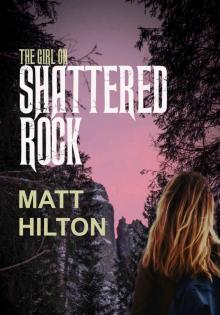 The Girl on Shattered Rock: A gripping suspense thriller
The Girl on Shattered Rock: A gripping suspense thriller Collision Course
Collision Course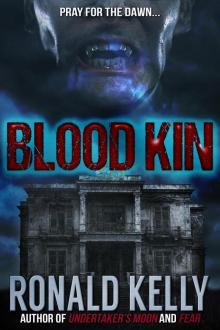 Blood Kin
Blood Kin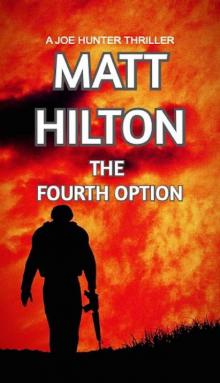 The Fourth Option
The Fourth Option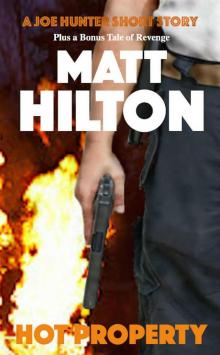 Hot Property: A Joe Hunter Short Story
Hot Property: A Joe Hunter Short Story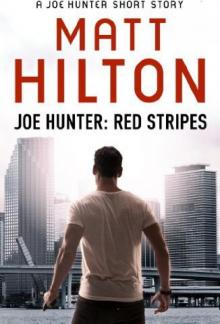 Red Stripes
Red Stripes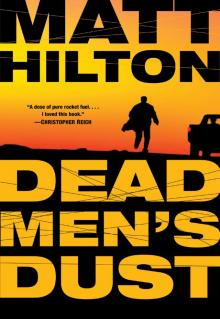 Dead Men's Dust
Dead Men's Dust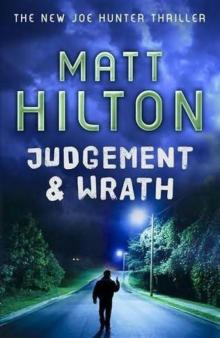 Judgement and Wrath
Judgement and Wrath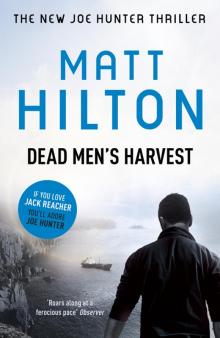 Dead Men's Harvest
Dead Men's Harvest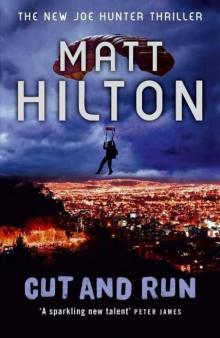 Cut and run jh-4
Cut and run jh-4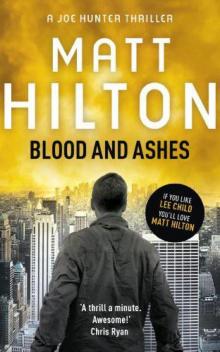 Blood and Ashes jh-5
Blood and Ashes jh-5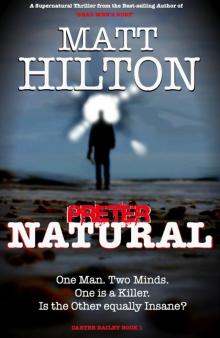 Preternatural: Carter Bailey Book 1
Preternatural: Carter Bailey Book 1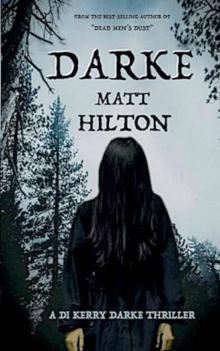 Darke
Darke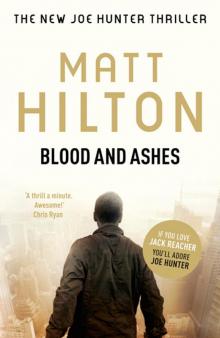 Blood and Ashes
Blood and Ashes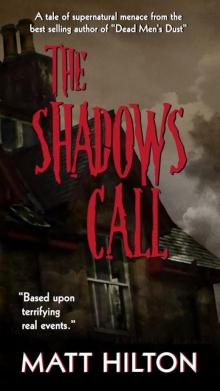 The Shadows Call
The Shadows Call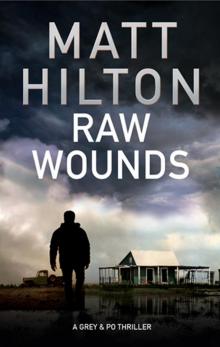 Raw Wounds
Raw Wounds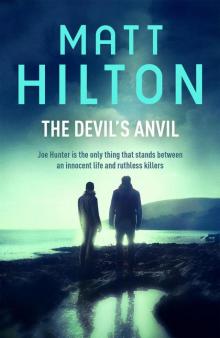 The Devil's Anvil
The Devil's Anvil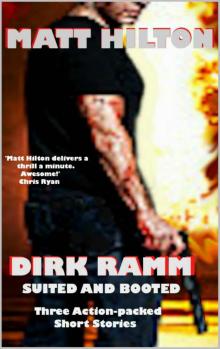 Dirk Ramm: Suited and Booted
Dirk Ramm: Suited and Booted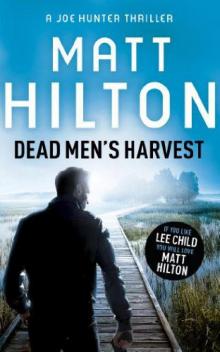 Dead Men's Harvest jh-6
Dead Men's Harvest jh-6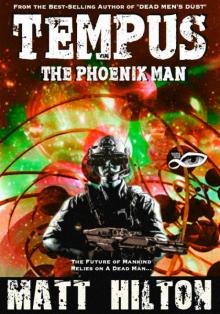 Tempus: The Phoenix Man
Tempus: The Phoenix Man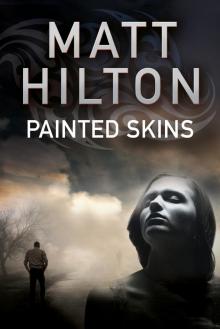 Painted Skins
Painted Skins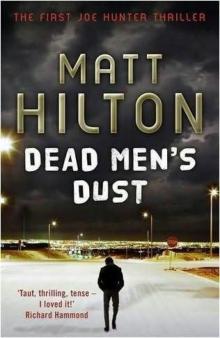 Dead Men's Dust jh-1
Dead Men's Dust jh-1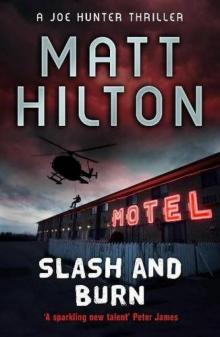 Slash and burn jh-3
Slash and burn jh-3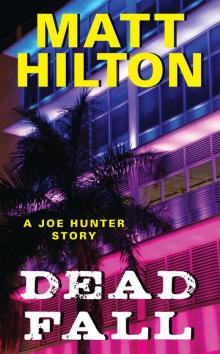 Dead Fall
Dead Fall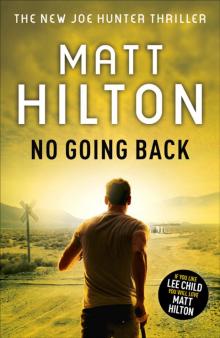 No Going Back - 07
No Going Back - 07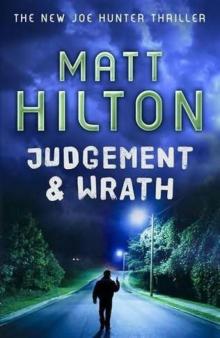 Judgement and Wrath jh-2
Judgement and Wrath jh-2